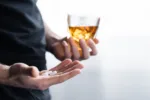Risks of Mixing Alcohol and Gabapentin

Mixing alcohol with prescription medications can have serious and sometimes life-threatening consequences. Gabapentin, commonly prescribed for nerve pain and seizures, is one medication that can be dangerous in combination with alcohol. Before mixing substances, individuals who have been prescribed gabapentin must understand the risks of drinking alcohol while taking this medication.
1. Understanding Gabapentin
Gabapentin, marketed under brand names like Neurontin, is primarily used to treat nerve pain (neuropathy) and seizures. It works by affecting certain neurotransmitters in the brain, reducing the perception of pain and controlling seizures. While generally considered safe when taken as prescribed, gabapentin can cause drowsiness, dizziness and impaired coordination, especially when first starting the medication or when the dosage is increased.
2. The Effects of Alcohol
Alcohol is a central nervous system depressant that affects brain function and impairs judgment, coordination, and motor skills. Consuming alcohol in moderation is generally safe for most adults, but excessive alcohol consumption can lead to a range of health issues, including liver damage, cardiovascular problems and addiction.
3. The Risks of Mixing Alcohol and Gabapentin
Combining alcohol with gabapentin can amplify the sedative effects of both substances, leading to increased drowsiness, dizziness and impaired cognitive function. This combination can also increase the risk of accidents, falls and injuries due to impaired coordination and judgment. Moreover, mixing alcohol with gabapentin may result in respiratory depression, a potentially life-threatening condition characterized by slowed breathing and oxygen deprivation.
4. Potential Health Complications
Long-term or frequent mixing of alcohol and gabapentin can have serious health consequences, including liver damage, gastrointestinal issues and neurological problems. Chronic use of both substances may also increase the risk of developing addiction or substance use disorder, leading to dependence and withdrawal symptoms when attempting to stop.
5. Seeking Professional Help
Mixing alcohol and gabapentin can have serious and potentially life-threatening consequences, including increased sedation, impaired cognitive function and respiratory depression. If you or someone you know is struggling with alcohol and gabapentin misuse, seek professional help.
Silvermist Recovery offers comprehensive, specialized treatment programs for individuals struggling with substance use disorders, including alcohol and gabapentin misuse. Treatment options may include detoxification, medical management, therapy and support groups. Our team of experienced professionals is committed to guiding you on the path to recovery and reclaiming a life free from addiction.






